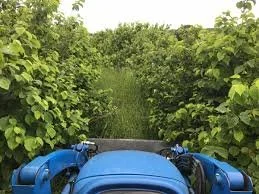A Living Blueprint: Partnering with Mark Shepard & New Forest Farm
At The Bitcoin Stewardship Initiative, we’re not just investing in projects, we’re backing blueprints for a regenerative future. That’s why we’re honored to support and collaborate with Mark Shepard and his pioneering work at New Forest Farm.
Located in the Driftless Region of Wisconsin, New Forest Farm is one of North America’s most iconic examples of commercial-scale permaculture in action. What was once degraded farmland is now a vibrant, resilient ecosystem of chestnut, hazelnut, apple, grape, livestock, and more. Strategically integrated through principles of perennial agriculture, water retention, and ecological succession. It’s not just a farm, it’s a living model of restoration economics.
About Mark Shepard
Mark Shepard is a globally respected leader in agroecology, permaculture design, and large-scale restoration agriculture. He is the author of Restoration Agriculture and Water for Any Farm, founder of New Forest Farm, and CEO of Restoration Agriculture Development. For over 25 years, Mark has applied systems thinking and natural patterns to regenerate land while producing food, fuel, and income.
Mark’s work blends ancient ecological wisdom with modern resilience strategies. His designs have influenced thousands of practitioners worldwide and reshaped the way we think about scalable regenerative agriculture.
A Personal Connection: Mark & Kriss
For Kriss Scioneaux, founder of The Bitcoin Stewardship Initiative, Mark Shepard is more than a mentor, he’s a foundational influence. The two met through a shared commitment to land-based solutions and quickly formed a working relationship grounded in mutual respect and aligned values. Mark’s work has helped shape Kriss’s own path from a U.S. Air Force nuclear weapons technician to a regenerative finance innovator.
Now, as part of TBSI’s installer network, Mark brings his decades of experience to bear on projects funded through Bitcoin-backed ecological investments. Together, they are turning regenerative agriculture into a measurable, investable, and transformative force for good.
“Mark showed me what’s possible when you take ecological principles seriously and treat restoration as a design problem, not just a moral obligation. His work lit the path that I’m now walking through TBSI.”
— Kriss Scioneaux



